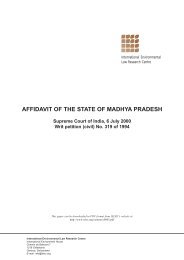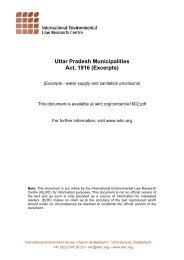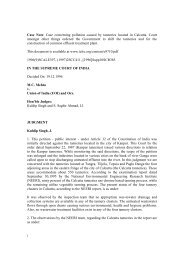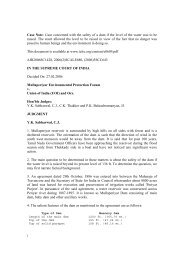T.N. Godavarman Thirumulpad v. Union of India - International ...
T.N. Godavarman Thirumulpad v. Union of India - International ...
T.N. Godavarman Thirumulpad v. Union of India - International ...
Create successful ePaper yourself
Turn your PDF publications into a flip-book with our unique Google optimized e-Paper software.
management and regulation, the FC Act <strong>of</strong> 1980 was enacted. It became necessary forconservation <strong>of</strong> forest on realizing that there has been large scale <strong>of</strong> deforestation whichis causing ecological imbalance leading to environmental deterioration. This led toenactment <strong>of</strong> the FC Act providing for prohibition for use <strong>of</strong> forest land for non-forestpurpose by anyone including the State Government or other authorities except with theprior approval <strong>of</strong> the Central Government. This legislature was enacted, as already noted,after Forest and Wildlife were taken out from the State list and placed in the Concurrentlist. At the same time, Article 48A was inserted in the Constitution <strong>of</strong> <strong>India</strong> for protectionand improvement <strong>of</strong> environments and safeguarding forest and wildlife in the year 1977.The basis objectives leading to the laying down <strong>of</strong> the National Forest Policy, 1988 mayalso be noted and also the need and requirement for its enforcement. This policy wasframed on realizing that 1952 Forest Policy for the management <strong>of</strong> State forest in thecountry had not halted the depletion <strong>of</strong> forests. It was, therefore, considered necessary toevolve a fresh policy for future to lay down new strategies <strong>of</strong> forest conservation whichhad become imperative. Conservation includes preservation, maintenance, sustainableutilization, restoration and enhancement <strong>of</strong> the natural environment. The principal aim <strong>of</strong>the forest policy is to ensure environmental stability and maintenance <strong>of</strong> ecologicalbalance including atmospheric equilibrium which are vital for sustenance <strong>of</strong> all lifeforms, human, animal and plant. The derivation <strong>of</strong> direct economic benefit must besubordinated to this principal aim.The forest policy has a statutory flavour. The non-fulfillment <strong>of</strong> aforesaid principle aimwould be violative <strong>of</strong> Articles 14 and 21 <strong>of</strong> the Constitution. The basic objectives <strong>of</strong> theForest Policy, 1988 are:"2.1 The basic objectives that should govern the National Forest Policy are the following:-- Maintenance <strong>of</strong> environmental stability through preservation and, where necessary,restoration <strong>of</strong> the ecological balance that has been adversely disturbed by seriousdepletion <strong>of</strong> the forests <strong>of</strong> the country.-- Conserving the natural heritage <strong>of</strong> the country by preserving the remaining naturalforests with the vast variety <strong>of</strong> flora and fauna, which represent the remarkable biologicaldiversity and genetic resources <strong>of</strong> the country.-- Checking soil erosion and denudation in the catchment areas <strong>of</strong> rivers, lakes reservoirsin the interest <strong>of</strong> soil and water conservation, for mitigating floods and droughts and forthe retardation <strong>of</strong> silation <strong>of</strong> reservoirs.-- Checking the extension <strong>of</strong> sand-dunes in the desert areas <strong>of</strong> Rajasthan and along thecoastal tracts.-- Increasing substantially the forest/tree cover in the country through massiveafforestation and social forestry programmes, especially on all denuded, degraded andunproductive lands.24
















